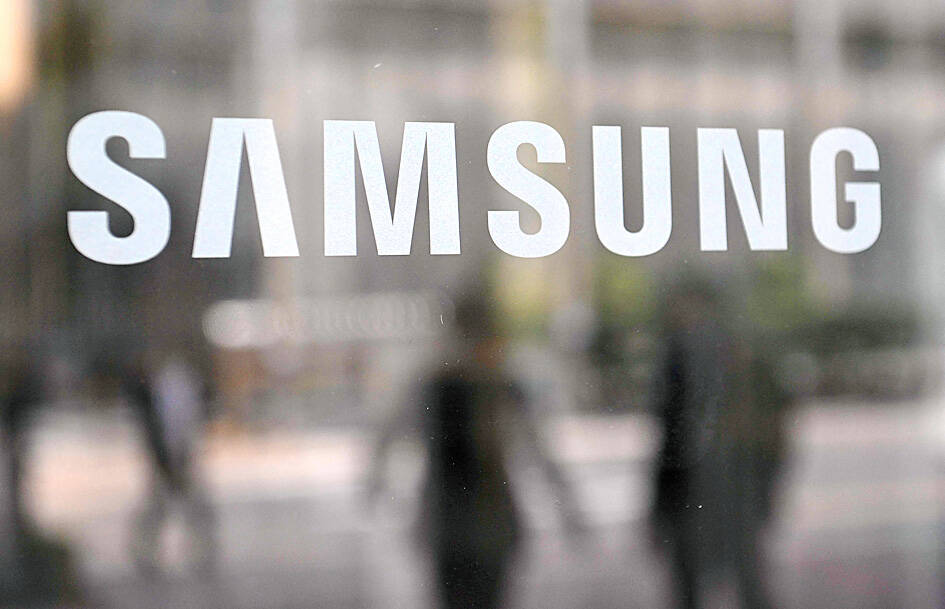Samsung Electronics Co and its largest labor union have tentatively agreed to a 5.1 percent wage increase and stock awards for staff this year, signaling efforts by the two sides to defuse tensions that triggered the company’s first-ever labor strike last year.
Under an initial agreement, Samsung would for the first time give 30 shares of the company to all employees — equivalent to about US$1,200 at yesterday’s closing price. Other perks include allowing each employee to purchase 2 million won (US$1,400) worth of Samsung’s electronics products at a discount, Samsung and the union said in a statement yesterday.
The National Samsung Electronics Union, which has about 37,000 members, is to vote on the preliminary agreement from Friday to Wednesday next week. The company is taking a step toward resolving labor tensions at a time when it is ceding market share to rivals in several key arenas. Samsung’s shares slid 1.6 percent in Seoul yesterday,

Photo: AFP
South Korea’s largest company lost more than one-third of its market value last year after failing to close the gap on SK Hynix Inc in the contest to sell advanced memory for Nvidia Corp’s artificial intelligence (AI) accelerators. It is also facing heightened competition in smartphones and other consumer electronics from Chinese rivals.
Among measures agreed upon initially, Samsung would begin a policy to rehire retirees with three or more children — reflecting the higher education costs such employees face and addressing domestic challenges.
South Korea has one of the world’s lowest birthrates, at just 0.72 children per woman in 2023.
The government is pouring more than 380 trillion won into baby-boosting incentives, including subsidies for prenatal care and monthly cash payments for families with children up to five years old.
Other companies are joining the endeavors. Booyoung Group, a housing construction company, began giving 100 million won to each employee who has given birth since last year. Gaming company Krafton Inc is planning to offer similar cash payments to staff.

In Italy’s storied gold-making hubs, jewelers are reworking their designs to trim gold content as they race to blunt the effect of record prices and appeal to shoppers watching their budgets. Gold prices hit a record high on Thursday, surging near US$5,600 an ounce, more than double a year ago as geopolitical concerns and jitters over trade pushed investors toward the safe-haven asset. The rally is putting undue pressure on small artisans as they face mounting demands from customers, including international brands, to produce cheaper items, from signature pieces to wedding rings, according to interviews with four independent jewelers in Italy’s main

Macronix International Co (旺宏), the world’s biggest NOR flash memory supplier, yesterday said it would spend NT$22 billion (US$699.1 million) on capacity expansion this year to increase its production of mid-to-low-density memory chips as the world’s major memorychip suppliers are phasing out the market. The company said its planned capital expenditures are about 11 times higher than the NT$1.8 billion it spent on new facilities and equipment last year. A majority of this year’s outlay would be allocated to step up capacity of multi-level cell (MLC) NAND flash memory chips, which are used in embedded multimedia cards (eMMC), a managed

In the wake of strong global demand for AI applications, Taiwan’s export-oriented economy accelerated with the composite index of economic indicators flashing the first “red” light in December for one year, indicating the economy is in booming mode, the National Development Council (NDC) said yesterday. Moreover, the index of leading indicators, which gauges the potential state of the economy over the next six months, also moved higher in December amid growing optimism over the outlook, the NDC said. In December, the index of economic indicators rose one point from a month earlier to 38, at the lower end of the “red” light.

The global server market is expected to grow 12.8 percent annually this year, with artificial intelligence (AI) servers projected to account for 16.5 percent, driven by continued investment in AI infrastructure by major cloud service providers (CSPs), market researcher TrendForce Corp (集邦科技) said yesterday. Global AI server shipments this year are expected to increase 28 percent year-on-year to more than 2.7 million units, driven by sustained demand from CSPs and government sovereign cloud projects, TrendForce analyst Frank Kung (龔明德) told the Taipei Times. Demand for GPU-based AI servers, including Nvidia Corp’s GB and Vera Rubin rack systems, is expected to remain high,